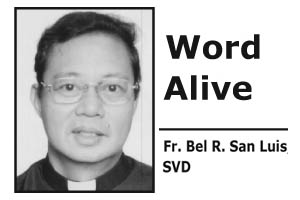THERE was once a woman who brought her child to church for baptism. “What’s the baby’s name?” asked the parish priest. “Toyota,” said the mother. Taken aback the priest said, “Why that name?” “Kasi po Father,” she replied, “iyong panganay ko ay nagngangalang ‘Ford,’ yong ikalawa naman ay ‘Mercedes’ at yong pinakamaliit ay ‘Beetle.’”
* * *
“A ganoon ba? Bueno, ano ang gusto mong ibibinyag ko sa kanya: diesel o gasolina?”
That funny story might well help to focus our attention on the feast of Christ’s Baptism today and the secularized way parents name their children nowadays.
* * *
When the Lord waded down the River Jordan and was baptized by John, the sacrament of baptism was inaugurated. Before ascending to heaven, Jesus made baptism a mandate, saying, “Go…make disciples of all nations, baptizing them in the name of the Father, the Son and the Holy Spirit” (Mt 28,15).
* * *
It is to the immense credit of Christian parents that they take to heart the baptism of their children.
It seems, however, that many baptized children grow up grossly ignorant of religious instructions and their obligations as Christians.
* * *
For instance, there are Catholics who come to church three times only in their whole lifetime – when baptized, married, buried or, as someone put it, when “hatched, matched, dispatched” (to the cemetery or columbarium).
* * *
The theologian Bernard Cooke in his book, Christian Sacraments and Christian Personality, writes: “Our baptism is not an action which happens once and has no further significance for our life. Rather, all the significance of this sacrament passes dynamically into the daily living of the Christian.”
* * *
In other words, it is not enough for us just to accept baptism passively or as something done to us. There must be a follow-up. Our baptism should become an operative power impelling us to act as Christ did.
* * *
In her booklet “Filipino Values and National Development: Readings on the Moral Recovery Program,” the late former Sen. Leticia Shahani bewails the fact that “there is no unit in government which has not been directly touched with corruption or indirectly affected by it.
* * *
“Throughout history, the BIR, the Bureau of Customs, the Commission on Immigration and Deportation, the regulatory commissions, the law enforcement offices have been the natural magnet for people who want to enrich themselves through the quick way.”
There are many reasons behind the social malady but one reason is that our Christian faith and morals have not really permeated and influenced the various spheres of socio-economic and political life.
* * *
Once I was trying to settle the quarrel between two feuding relatives. “Let’s forgive one another,” I appealed. “Christ told us to forgive.”
The lady shot back with a reply that almost floored me: “Father, puede ba, huwag natin isali ang Diyos sa usapan na ito!” (Father, please, let’s not include God in this talk!).
* * *
It’s not enough to be baptized. Baptismal faith should mature. To be authentic and effective, it should influence our day-to-day life, relationships and transactions.
* * *
WRONG USE OF BAPTISM. Some years ago in the USA, the news media reported that a father had his one-year-old son baptized 26 times in three years.
When he was asked by a reporter why he had done this, the father answered, “Very simple. Each new godfather was good for at least one loan.”
The use of sacraments for material gain is grossly immoral. In the Philippines, it’s more of having many godparents to serve as political or social connections.
* * *
APPEAL FOR SEMINARIANS. We Filipinos are very blest because there are still a good number of young men who wish to become priests and missionaries. But some are hard up in pursuing their priestly aspiration due to financial constraint.
May I appeal to our readers to chip in or sponsor our seminarians’ schooling for one year.
For inquiry, e-mail me at: [email protected].



